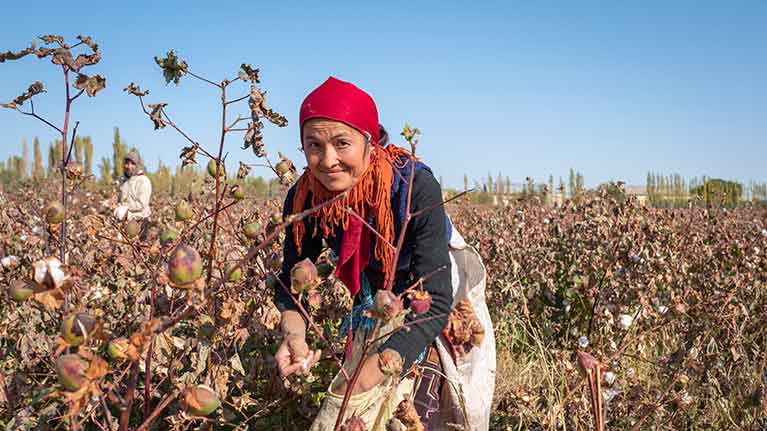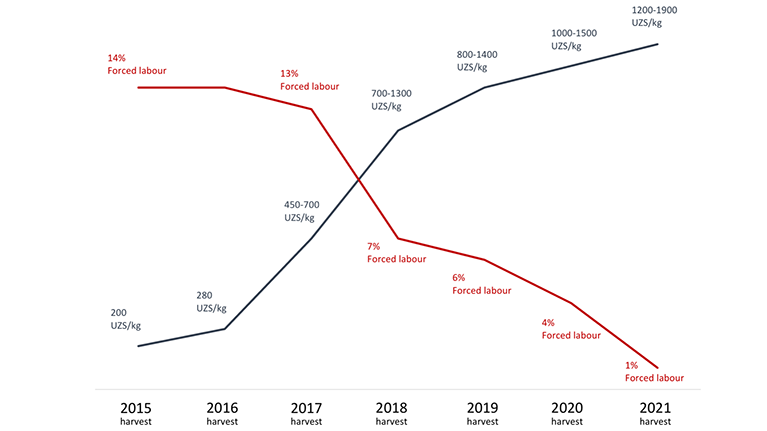Uzbek cotton is free from systemic child labour and forced labour
Almost two million people are recruited every year for the annual cotton harvest in Uzbekistan. The country has succeeded in eradicating forced and child labour during the 2021 cotton production cycle, according to new ILO findings.

GENEVA (ILO News) – An estimated two million children have been taken out of child labour and half a million adults out of forced labour since the reform process of the Uzbekistan’s cotton sector began seven years ago.
According to the forthcoming 2021 ILO Third-Party Monitoring Report of the Cotton Harvest in Uzbekistan based on eleven thousand interviews with cotton pickers, 99 per cent of those involved in the 2021 cotton harvest worked voluntarily. All provinces and districts had very few or no forced labour cases.
About one per cent were subject to direct or perceived forms of coercion. The data shows that 0.47 per cent of respondents reported direct or perceived threats by Mahalla representatives (local officials at the community level) related to social benefits, and 0.12 per cent of respondents reported direct or perceived threats by employers related to loss of employment or wages.
The findings are the latest from the ILO Third-Party Monitoring project, which has been monitoring the cotton harvest in Uzbekistan since 2015 under an agreement with the World Bank.
A majority of cotton pickers who took part in interviews said that working conditions had improved since 2020. Only five per cent said that the conditions were worse than the previous year. This relates to transportation, food, access to water, hygienic and other facilities.
According to the report, one in eight people of working age in Uzbekistan participated in the cotton harvest – the world’s largest recruitment effort. Sixty-two per cent of pickers were women, and the vast majority were from rural areas.

“Our collaboration has yielded good results – because after 7 years, this year’s report shows that Uzbek cotton is free from child labour and forced labour,” said ILO Director-General Guy Ryder. “There is now an opportunity for Uzbekistan to realize its goal of moving up the value chain and to create millions of decent full-time jobs in textile and garment manufacturing.”
Uzbekistan is the sixth largest cotton producer in the world. Under the leadership of President Shavkat Mirziyoyev, the country has embarked on reforms that include the modernization of the country’s former agricultural economic model and the eradication of child labour and forced labour in the annual cotton harvest that was previously prevalent.
“We undertook these reforms to benefit our people and our economy. The starting point was to abolish the state order system for cotton production but we didn’t stop there,” said Tanzila Narbaeva, the Chair of the Uzbek Senate and Head of the National Commission to Combat Forced Labour and Human Trafficking.
“We worked tirelessly to change thinking and behaviour through awareness raising campaigns on labour rights. We criminalized child labour and forced labour. We enhanced our labour inspection and we engaged in dialogue with civil society to identify common ground and solutions.”
Jonas Astrup, Chief Technical Advisor of the ILO TPM Project in Uzbekistan said that monitors observed new developments which indicate the democratization of the labour market in Uzbekistan.
“For the first time, the minimum wage was consulted with not only the government but also the trade unions and employers of Uzbekistan. We also observed an emerging trend of collective bargaining at the grass-root level. Cotton pickers would engage in informal wage negotiations with farmers and textile clusters. Many pickers were paid well above the minimum wage as a result.”
Shukrat Ganiev, an independent human rights activist who has been monitoring the cotton harvest with ILO for several years said, “We need to shift our focus to decent job creation. People in Uzbekistan need jobs with decent wages and good working conditions. To get there we need international brands and retailers to engage in responsible sourcing from Uzbekistan.”
The ILO Third-Party Monitoring project is implemented with support from the European Union, the US State Department, the Government of Switzerland, and Germany. It will conclude in May this year and by request of the government, and workers’ and employers’ organizations in Uzbekistan a feasibility study for a Better Work programme will be undertaken. The Better Work Programme is a joint initiative of the ILO and The World Bank Group.
The 2021 ILO Third-Party Monitoring Report of the Cotton Harvest in Uzbekistan will be published on 29 March.
➡️ Source: https://www.ilo.org/global/about-the-ilo/newsroom/news/WCMS_838396/lang--en/index.htm









